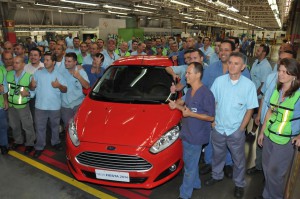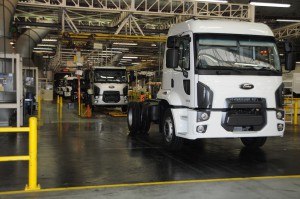
São Bernardo do Campo is Ford's oldest plant in Brazil. It makes the Fiesta and will be closed later this year.
When Ford Motor Co. and Volkswagen AG announced they were talking about potential partnerships in the near future, one area many believed they would discuss was their businesses in South America.
The South American market has been tough sledding for much of the last decade and the two sides had linked up before with AutoLatina, which ceased operations in 1995.
However, Ford isn’t waiting on a tie-up with VW to make moves down there, saying today it plans to close its oldest plant in Brazil resulting in 2,700 layoffs as it exits the commercial truck business in South America.
The automaker is ending production at the São Bernardo do Campo plant in Brazil this year, ending sales of the Cargo lineup, F-4000 and F-350, as well as the slow-selling Fiesta small car once inventories are depleted.The move is part of the company’s ongoing global reorganization efforts.
(General Motors eyes cuts in Brazil. Click Here for the story.)
“Ford is committed to the South American region by building a sustainable and profitable business with strengthened product offerings, outstanding customer experience, and a leaner more agile business model,” said Lyle Watters, president, Ford of South America.
São Bernardo do Campo is located an industrial suburb of São Paulo and has been in operation since 1967. It first produced a number of auto models before being switched predominantly to trucks in 2001, and makes all of the products being discontinued, including the Fiesta.
While the move is necessary, what it doesn’t make clear is the possibility of a partnership between Ford and VW in South America, or more specifically, what any kind of pairing would look like.
(Ford, VW could roll out a series of deals over coming weeks and months. Click Here for the story.)
Ford and VW have already struck a deal encompassing commercial vans and pickup trucks in Europe. Many believe another deal covering battery-electric vehicles and autonomous cars won’t be far behind — although recent reports suggest the two sides are much farther apart than initially thought.
In the meantime, Ford is focusing on fixing its existing business south of the equator. This decision follows other recent initiatives in the region including reducing salaried and administrative costs region-wide by more than 20% over the past few months; strengthening portfolio with SUVs and pickups that are growing in popularity with consumers while ceasing Focus production in Argentina; and leveraging global partnerships, such as the recently announced alliance with VW to develop midsize pickup trucks
In connection with this announcement, the company expects to record pre-tax special item charges of about $460 million. The charges will include approximately $100 million of non-cash charges for accelerated depreciation and amortization.
(To see more about VW’s efforts to restart sales in Brazil, Click Here.)
The remaining charges of about $360 million will be paid in cash and are primarily attributable to separation and termination payments for employees, dealers, and suppliers. Most of these pre-tax special item charges and cash outflows will be recorded in 2019 and are part of the $11 billion in EBIT charges with cash-related effects of $7 billion the company expects to take in the redesign of its global business.

